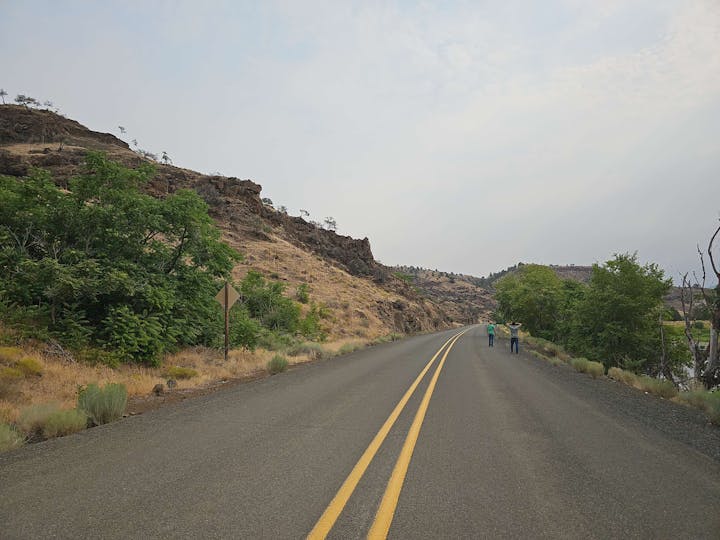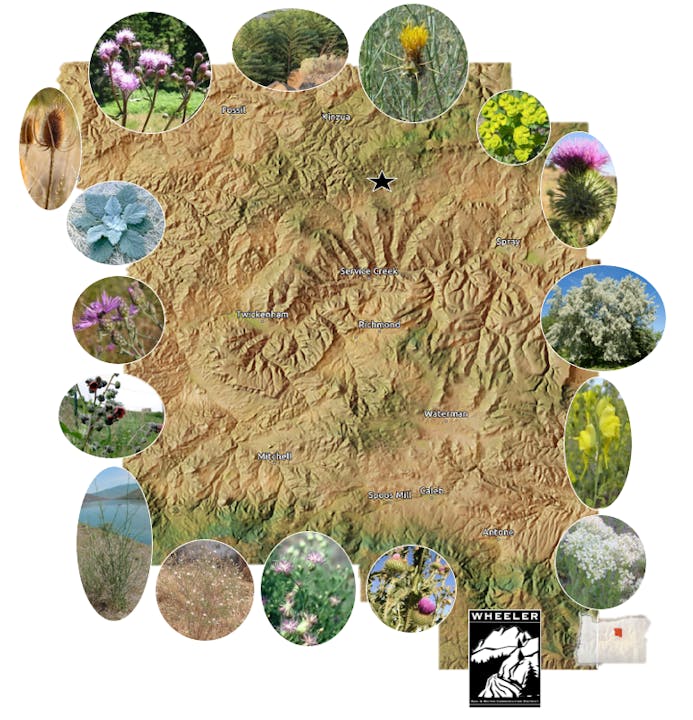Weeds
.jpg?ixlib=rb-1.1.0&w=2000&h=2000&fit=max&or=0&s=1b1102f076e055f969ec5a3ba3d3eef2)
Weeds in Wheeler County have been and are a major concern to our natural resources. They impact not only the healthy function of our ecosystem, but they also diminish the economic and recreational opportunities of our land. Weeds decrease desirable vegetation. This leads to lower carrying capacity on rangelands, both for wildlife and domestic animals. In addition, lands without desired vegetation have higher erosion and runoff rates. Here in the John Day River country, that means loss of valuable topsoil and higher amounts of sedimentation in the streams which raises the water temperature, negatively affecting the steelhead populations. Wheeler SWCD has taken the lead in coordinating the fight against noxious and invasive weeds in Wheeler County.
The district staff oversees monitoring, inventorying, mapping, and control efforts in the county. They also coordinate with public and private entities. There are many facets to the Wheeler SWCD noxious weed program. Weed control is the program’s primary goal and is accomplished through cost-share grants and interagency coordination. Cost-share grants are planned and written by district staff for a specific weed control project. If awarded, the grant will fund the necessary herbicides; the landowners are then responsible for the herbicide application on the acres listed in the grant agreement.
The district is looking into other weed control options in addition to cost-share grants. One option is to promote more use of biological controls. One way this can be achieved is for district staff to travel to collection sites once or twice a month, collect, and then distribute the biological controls the following day.

Other than writing and administering cost-share grants, the major responsibility of district staff is monitoring, inventorying, and mapping noxious weeds. District staff are also in charge of public outreach, education, and weed awareness. In the fall of the year, the Wheeler SWCD, in conjunction with the Wheeler County Extension Service, offers a pesticide license recertification class. Additional educational opportunities are planned throughout the year. All public support and weed workshop ideas are welcome.
District staff are always looking for weed infestations. Any private landowners with weed problems can call the Wheeler SWCD at (541) 468-2990 to arrange for a site visit to their property.
Wheeler SWCD Noxious Weed Guidebook, 2024
Wheeler County may be one of the smallest counties within the state of Oregon, but it experiences some of the biggest struggles with invasive noxious weeds. Noxious weeds are a threat to Wheeler County’s natural resources, croplands, rangelands, wildlife habitats, and native plant communities. Most noxious weeds are toxic to livestock and carriers of detrimental insects, diseases, or parasites. Invasive weeds can be so aggressive, they harm our local ecosystems and disrupt agricultural production. They crowd out the native species that fish and wildlife depend on and increase erosion rates, sending sediment into streams.
A number of residents in Wheeler County take pride in their croplands, rangeland, gardens, flower beds, and lawns, therefore weed control is an essential part of all types of production. Wheeler County does not employ a Weed Inspector; therefore, does not enforce ORS 569.390 through notice or fines, unlike many counties within the state; but, for the health of your land, Wheeler SWCD urges you to make an effort for control of all noxious and invasive weeds.
This guide will help provide the information needed for successful control of common noxious weeds found in Wheeler County.



